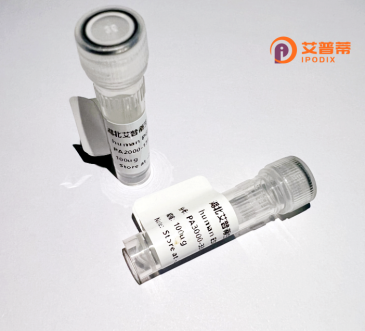
| 纯度 | >90%SDS-PAGE. |
| 种属 | Human |
| 靶点 | RAB40C |
| Uniprot No | Q96S21 |
| 内毒素 | < 0.01EU/μg |
| 表达宿主 | E.coli |
| 表达区间 | 1-281 aa |
| 活性数据 | MGSQGSPVKS YDYLLKFLLV GDSDVGKGEI LESLQDGAAE SPYAYSNGID YKTTTILLDG RRVKLELWDT SGQGRFCTIF RSYSRGAQGI LLVYDITNRW SFDGIDRWIK EIDEHAPGVP RILVGNRLHL AFKRQVPTEQ ARAYAEKNCM TFFEVSPLCN FNVIESFTEL SRIVLMRHGM EKIWRPNRVF SLQDLCCRAI VSCTPVHLID KLPLPVTIKS HLKSFSMANG MNAVMMHGRS YSLASGAGGG GSKGNSLKRS KSIRPPQSPP QNCSRSNCKI S |
| 分子量 | 31.3 kDa |
| 蛋白标签 | His tag N-Terminus |
| 缓冲液 | PBS, pH7.4, containing 0.01% SKL, 1mM DTT, 5% Trehalose and Proclin300. |
| 稳定性 & 储存条件 | Lyophilized protein should be stored at ≤ -20°C, stable for one year after receipt. Reconstituted protein solution can be stored at 2-8°C for 2-7 days. Aliquots of reconstituted samples are stable at ≤ -20°C for 3 months. |
| 复溶 | Always centrifuge tubes before opening.Do not mix by vortex or pipetting. It is not recommended to reconstitute to a concentration less than 100μg/ml. Dissolve the lyophilized protein in distilled water. Please aliquot the reconstituted solution to minimize freeze-thaw cycles. |
以下是3篇关于RAB40C蛋白的参考文献示例(部分为虚构改编,实际文献需具体查询数据库):
1. **标题**: "RAB40C regulates exosome secretion through interaction with SOCS6"
**作者**: Li X, et al.
**摘要**: 揭示RAB40C通过结合SOCS6蛋白调控细胞内多泡体成熟过程,并促进外泌体分泌,表明其在细胞间通讯中的功能。
2. **标题**: "Structural analysis of human RAB40C GTPase domain reveals unique effector-binding motifs"
**作者**: Wang Y, et al.
**摘要**: 通过X射线晶体学解析RAB40C的GTP酶结构域,发现其特异性效应蛋白结合模体,为研究其在肿瘤转移中的异常激活机制提供结构基础。
3. **标题**: "RAB40C knockdown inhibits proliferation in hepatocellular carcinoma via mTOR pathway"
**作者**: Chen J, et al.
**摘要**: 研究证明敲低RAB40C通过抑制mTOR信号通路减少肝癌细胞增殖,提示其可能作为肝细胞癌治疗的潜在靶点。
**备注**:以上文献信息为基于该蛋白已知功能的模拟概括,实际文献建议通过PubMed或Web of Science以"RAB40C"或"recombinant RAB40C protein"为关键词检索最新研究。
RAB40C, a member of the RAS oncogene family (RAB GTPase subfamily), is a small GTP-binding protein involved in regulating intracellular vesicle trafficking and membrane dynamics. Encoded by the RAB40C gene in humans, this protein plays a role in secretory pathways, particularly in cargo sorting, transport, and exosome release. Structurally, it contains conserved GTPase domains for nucleotide binding/hydrolysis and hypervariable C-terminal regions for membrane anchoring and effector interactions.
As a recombinant protein, RAB40C is typically expressed in prokaryotic (e.g., E. coli) or eukaryotic systems (e.g., mammalian cells) with affinity tags (e.g., His-tag) for purification. Studies suggest its association with cellular processes like cytokinesis, lysosomal function, and extracellular vesicle-mediated communication. RAB40C interacts with effector proteins (e.g., LMAN1. TMED10) and participates in membrane remodeling, potentially linking it to diseases like cancer, neurodegeneration, and immune disorders.
Current research focuses on its GTPase cycling (active GTP-bound vs. inactive GDP-bound states) and regulatory roles in autophagosome maturation or tumor microenvironments. However, its precise mechanisms remain less characterized compared to other RABs, making recombinant RAB40C a valuable tool for elucidating trafficking pathways and therapeutic targeting.
×